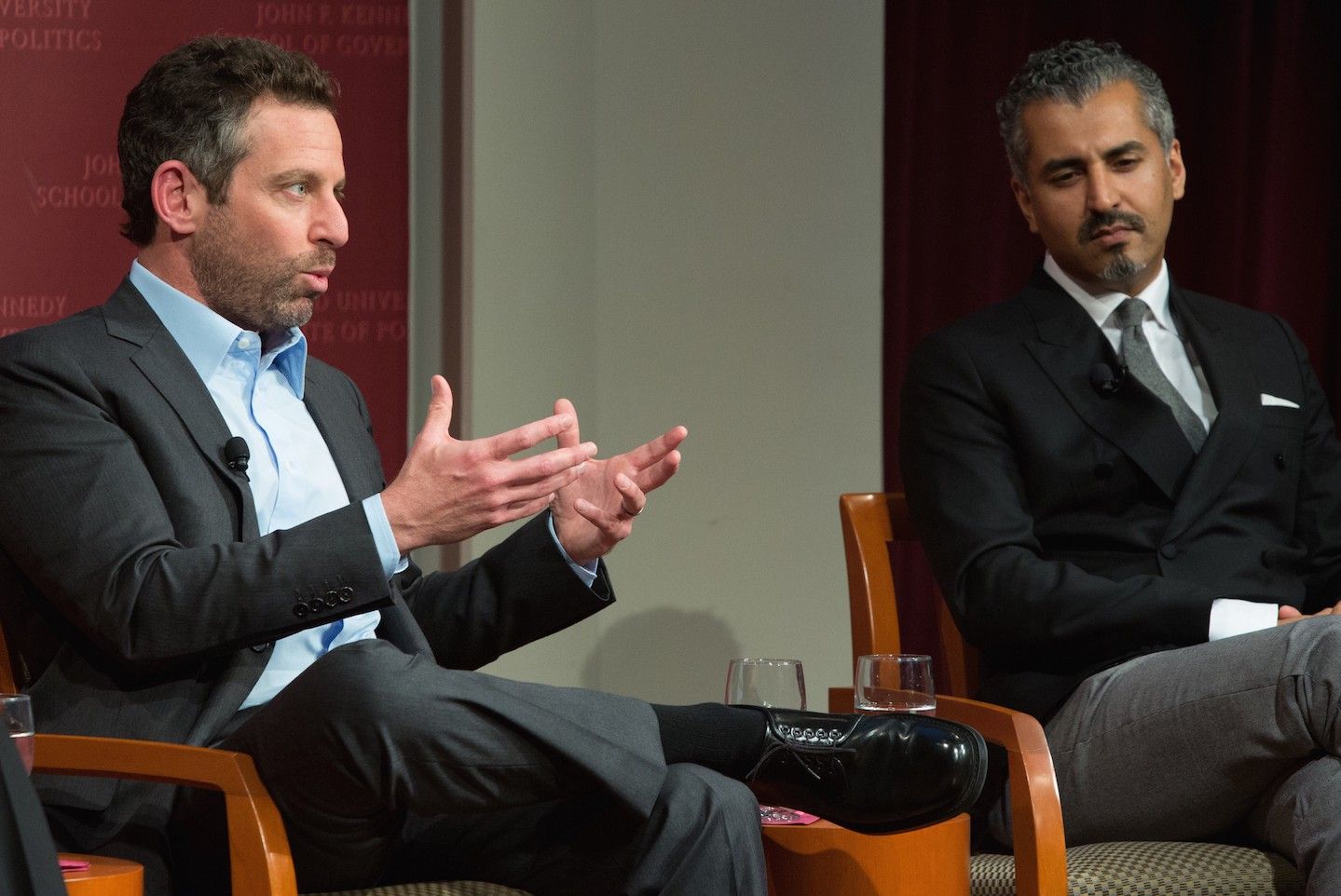The Quilliam Foundation, a counter-extremism think-tank in London that has influenced British government national security strategies, has received over a million dollars in funding from an American conservative philanthropic organisation, with close ties to the Tea Party and extreme right-wing Christian networks.
The funding comes in the form of a grant from the John Templeton Foundation, for a total of $1,080,997, covering the period from September 2014 to June 2017.
One of the project leaders for the grant is Ghaffar Hussain, a former managing director of the Quilliam Foundation. Hussain is no longer formally employed by Quilliam, however. Today, he manages the government’s Preventing Violent Extremism (Prevent) programme in the London Borough of Newham.
Templeton, the Christian right, and anti-science
In 2014, ‘New Atheist’ icon Sam Harris donated $20,000 to the Quilliam Foundation. Harris has advocated “war with Islam,” including defending regime change in Iraq, advocating torture, and promoting mass profiling of Muslims “or anyone who looks like he or she could conceivably be Muslim.”
Despite his engagements with Nawaz, as exemplified in their co-authored book, Islam and the Future of Tolerance, Harris has never renounced such views, and Nawaz has not challenged them.
Ironically, a recent investigation commissioned by Harris concluded that the John Templeton Foundation, which now funds Quilliam, had a worrying “history of funding what could be seen as anti-science activities and groups.”
The John Templeton Foundation specialises in funding programmes that bring science and religion closer, including in some cases sponsoring dubious pseudo-scientific projects on ‘faith healing.’
For that reason, the Foundation is shunned by many prominent scientists, including for instance the well-known biologist Richard Dawkins. These scientists criticise the foundation’s promotion of conservative Christian religious ideology and right-wing causes.
A new peer-reviewed study in Sociation Today notes that the John Templeton Foundation is among a network of 32 foundations and one corporation (ExxonMobil) “that have supplied funds to the five organisations involved in actively mobilising tea party activists.” On a more particular level, the authors conclude, “the Templeton Foundation is a key player in the funding of right-wing organisations, including two that have served as active agents of mobilisation for the tea party movement.”
Between 2008 and May 2015, the Foundation’s head until his death was Jack Templeton, who has poured money into opposing same-sex marriage and defending the Iraq War.
In 2009, Templeton sat on Mitt Romney’s National Faith and Values Committee, and in 2012, he was the second largest donor to the super-PAC that supported far-right Republican Rick Santorum’s presidential primary campaign.
During the 2012 Republican primaries, Mitt Romney said he would ban Muslims from appointment to his presidential cabinet since “based on the numbers of American Muslims in our population” as a percentage, “I cannot see that a cabinet position would be justified.”
Rick Santorum similarly endorsed the racial profiling of Muslims, and most recently endorsed Donald Trump’s ban on Muslim immigration to the US on the grounds that “Islam is different.”
Templeton financed his own right-wing organisation, Let Freedom Ring, which supports the Tea Party. He and his wife donated more than $1 million to call for banning gay marriage. The Foundation has also financed the Atlas Economic Research Foundation and Acton Institute for the Study of Religion and Liberty, which regularly campaign against the scientific consensus on climate change, as well as pro-war neoconservative groups like the American Enterprise Institute.
In 2014, the same year that Quilliam received its million dollar 3-year funding package, the John Templeton Foundation participated in a shadowy annual “conference of hard-right Christian organizations” known only as “The Gathering.” According to the Daily Beast, where Maajid Nawaz is a columnist, ‘The Gathering’ is a convening of “many of the wealthiest conservative to hard-right evangelical philanthropists in America.”
Collectively, ‘The Gathering’ funders, including the John Templeton Foundation, distribute over $1 billion a year in grants. Their goal in coming together annually is to align their funding strategies to promote:
“… opposition to gay rights and reproductive rights, for example, and also a global vision that involves the eventual eradication of all competing belief systems that might compete with The Gathering’s hard-right version of Christianity.”
More ironically, in 2007, Maajid Nawaz’s current co-author Sam Harris, along with Richard Dawkins and nine other advisory board members of Harris’ Project Reason, were sufficiently concerned by the Templeton Foundation’s ideological impact on scientific research that they commissioned science writer Sunny Bains to investigate.
According to the Nation, her resulting paper, which was published in 2011 in the Sage journal, Evolutionary Psychology, found the following:
“… evidence of pervasive cronyism: more than half of the past dozen Templeton Prize winners were connected to the foundation before their win, and board members do well obtaining grant money and speaking gigs. Bains also argues that the true atheistic tendencies of leading scientists were misrepresented in the foundation’s Big Questions advertisements. Templeton’s mission, Bains concludes, is to promote religion, and its overtures to science are an insidious trick with the purpose of sneaking in God.”
London Prevent manager is ‘lead’ for Quilliam project financed by Templeton
Grant documentation from the John Templeton Foundation obtained by INSURGE intelligence identifies a former Quilliam staffer Ghaffar Hussain and Quilliam senior researcher Usama Hasan as “Project Leaders” for the million dollar grant from 2014 to 2017.
Ghaffar Hussain’s last publicised position at the Quilliam Foundation was as managing director in 2014.
Ghaffar is presently Community Resilience Manager for the Preventing Violent Extremism (Prevent) program in the London Borough of Newham. The Borough’s previous Prevent work has been recognised as “best practice” by the Home Office and the Department of Education, which means that local approaches are scoped and applied nationally.
In this capacity, Ghaffar oversees the implementation of the government counter-extremism strategy across the borough, and frequently provides direct training on how to implement the ‘Prevent duty’ under new legislation requiring public sector workers to spot and report signs of radicalisation.
In December last year, a statement issued by East London Muslim religious leaders, teachers, community groups, anti-racist organisations, local politicians, and university student unions, stated that Prevent in Newham “exclusively targeting young Muslims for the views they hold on religion or issues such as government foreign policy,” including cracking down on “normal Muslim religious practice.”
According to The Guardian, “this hardening coincided with the council’s hiring of a former director of the Quilliam Foundation, a UK counter-terrorism thinktank that has long argued for a tougher line on non-violent extremism.”
Although Ghaffar Hussain is no longer a director at Quilliam, grant documents seen by INSURGE reveal that he effectively remains affiliated to Quilliam as a consulting project lead for its Templeton Foundation-funded programme.
In June 2015, a letter from the head teachers of Monega Primary School in Newham invited parents to attend a session with a social worker on “how to prevent and detect radicalisation.”
The letter was addressed to parents of children as young as four years old, prompting several independent education consultants to criticise the measures for relying on “the discredited idea that there are signs of extremism that can be detected in young children.”
Ghaffar Hussain’s undeclared relationship with the Quilliam Foundation raises a fundamental question about conflicts of interest, especially regarding his ability to oversee the Prevent programme fairly given his connection to a think-tank with extreme right financing.
As Quilliam’s ‘Project Lead’ on a programme of work funded by the John Templeton Foundation, which is part of a network of extreme right-wing Christian philanthropists who fund anti-Muslim, homophobic and misogynist bigotry, Ghaffar Hussain’s suitability for a post requiring “locally sensitive approaches to tackle extremism” is in serious doubt.
Hussain’s position further points to the conflict of interest in the Quilliam Foundation’s relationship with government. Despite Hussain being a project lead for the Quilliam Foundation, he is simultaneously working in a senior role to implement the government’s Prevent programme, while Quilliam puts itself forward in public as an independent authority on counter-extremism issues.
Quilliam finds itself in the unusual position of serving as a mouthpiece for a government strategy which one of its own is implementing on behalf of the government. This further demonstrates the serious conflict of interest at the heart of Prime Minister David Cameron’s new Community Engagement Forum, which is working with Quilliam to tackle extremism online and in communities.
Muslim reform through counter-insurgency
One of the major projects commissioned by Quilliam using the grant from the John Templeton Foundation was the creation of a YouTube video #NotAnotherBrother.
The video opens with a British ‘foreign fighter’ reading a letter from his elder brother apologising for unwittingly encouraging him to join a terror group.
The firm that made the video on behalf of Quilliam is a Whitehall-based marketing agency, Verbalisation, run by Sven Hughes, a former British Army reservist with the Ministry of Defence’s 15 (UK) Psychological Operations Group in Afghanistan.
In 2007, Hughes consulted on psychological operations (PSYOPS) for the NATO-led International Security Assistance Force (ISAF) in Kandahar, Afghanistan.
Verbalisation’s in-house research arm, the Centre for Applied Intelligence, claims to have built a science-based technique able to “drive behaviour change through language” — a notion straight out of the counterinsurgency playbook.
Hughes’ employees at Verbalisation are “largely ex-military personnel and political campaigners.” This includes Verbalisation’s Information Operations Director, David Stanhope, who previously spent eight years in 15 (UK) Psychological Operations Group.
In a contribution to the 2012 Routledge volume, Counter-Terrorism and State Political Violence, sociologist Professor David Miller of the University of Bath and counter-terrorism specialist Dr. Rizwaan Sabir of Edge Hill University review a wealth of official UK and US government counter-terrorism documents.
A key figure in the information operations component of British counter-insurgency strategy, they report, is Steve Tatham, who as of last year was Special Information Operations project officer in the UK Ministry of Defence Operations Directorate.
From 2010 to 2013, Tatham was Commanding Officer of MoD’s 15 (UK) Psychological Operations Group, and thus David Stanhope’s boss during the latter half of his term there. In 2011, Verbalisation’s Stanhope had a stint as a consultant for the defense contractor, Strategic Communications Laboratory (SCL) Group, which specialises in “behavioural dynamics.”
In partnership with Tatham’s own consultancy — the Information Operations Training and Advisory Services Global (IOTA-Global) — SCL Group developed and now regularly delivers a bespoke NATO course on ‘Target Audience Analysis Methodology.’
In 2009, Tatham was seconded from the MoD’s Defense Academy to the Cabinet Office’s Strategic Horizons Unit (SHU).
Tatham’s boss at the Defense Academy was Army veteran Dr Jamie Macintosh, who later became a senior MoD research scientist, co-authoring the White Paper behind the 2001 establishment of the Civil Contingencies Secretariat (CCS) in the government’s Cabinet Office.
The CCS, write Miller and Sabir, was responsible for issuing information on the so-called ‘ricin plot’ which, it later emerged in court, never existed. As personal adviser to Home Secretary John Reid, Macintosh went on to play an “instrumental” role in creating the Home Office’s Organization for Security and Counter Terrorism (OSCT) and its propaganda arm, the Research, Information and Communications Unit (RICU).
In 2011, Macintosh was a key witness for Keeping Britain Safe, the inaugural report of the All-Party Parliamentary Group on Homeland Security (run by the neoconservative Henry Jackson Society), which argued that there is no distinction between violent and non-violent extremists.
The foreword to this HJS report was written by Michael Chertoff, former US Secretary for Homeland Security, whose private intelligence firm, the Chertoff Group, is managed by Chad Sweet — Chertoff’s former chief of staff in the Bush administration.
From 2011 to 2013, corporate records reveal that Chertoff’s erstwhile CEO Chad Sweet was on the Quilliam Foundation’s US Board of Directors, while simultaneously moonlighting as campaign coordinator for anti-Muslim bigot, Republican presidential candidate Ted Cruz.
The crap science behind Quilliam’s counterinsurgency ‘viral’ campaign
Internal defence industry reviews of PSYOPS strategies in Iraq and Afghanistan that form of the basis of Verbalisation’s work, invariably conclude that they have failed dramatically.
A 2012 RAND analysis commissioned for the US Marine Corps Intelligence Activity, concluded that the “overall IO [information operations] mission in Afghanistan… has not been achieved,” especially with regards “the inability to effectively counter the Taliban propaganda campaign against US and NATO forces on the theme of civilian casualties, both domestically and internationally.”
Even more damningly, Tatham himself co-authored a UK Defence Academy report concluding that the fiasco of PSYOPS in Afghanistan was due to “the corporate failure to adapt IO and PSYOPS’s operating practices to the 21st century, instead relying upon ages-old methods of communication now proven moribund.” In particular, he blamed the “over reliance of IO and PSYOPS on commercial advertising and marketing strategies.”
Unfortunately, it is not clear that the new so-called ‘behavioural science’ based approach to counterinsurgency PSYOPS touted by the likes of Verbalisation — as applied by Quilliam in their anti-ISIS video campaign — works any better.
On their corporate LinkedIn page, Verbalisation posted optimistically just as they launched Quilliam’s ‘Not Another Brother’ video:
“A global reach of over 500 million in just 7 days. That’ll be the results of our recent viral campaign for Quilliam.”
Haras Rafiq repeated this grand claim in his recent testimony last year before the House of Commons Home Affairs Select Committee, when he boasted that the campaign had “generated half a billion impressions.”
The reference to ‘impressions’ is essentially marketing-speak for a misleading metric that is “disingenous at best” according to Andy White, Director of Strategy at Sprout Social.
In reality, after two months, Quilliam’s main 1 minute and 42 second ‘viral video’ had received just 52,749 views. An extended 3 and a half minute version of this ‘viral video’ had received a meager 10,849 views in the same time-frame.
The abject failure of Quilliam’s counterinsurgency-inspired “viral” campaign — despite disproportionately hyperactive media coverage — demonstrates that all the trappings of MoD-inspired ‘behavioural science’ amounts to little when, from the outset, the population being targeted is reduced to exactly that: a target.
This article was amended on 18th January 2015 to specify that Steve Tatham was involved in information operations as part of Ministry of Defence counter-terrorism strategies.







